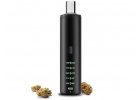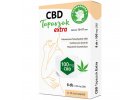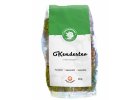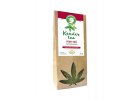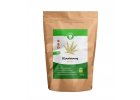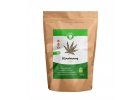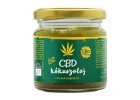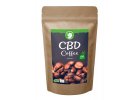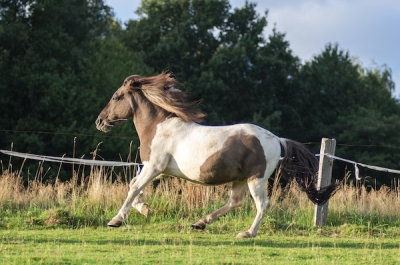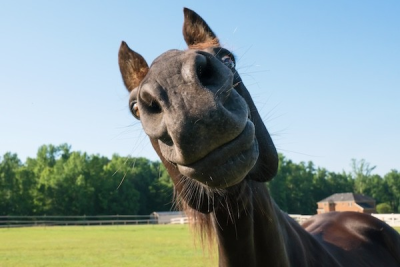What are the effects of CBD on PSSM in horses?
Author: Lucie Garabasova
PSSM, or polysaccharide storage myopathy, is a genetic disorder affecting the muscles of horses, and it is a significant concern for almost every horse owner. Horses with this condition struggle with storing polysaccharides, leading to episodes of muscle stiffness, which can be both painful and psychologically taxing. Let's explore how CBD may impact PSSM in horses and whether it can help improve their quality of life.
What does PSSM mean?
PSSM stands for Polysaccharide Storage Myopathy, a genetically inherited condition that affects the muscles of horses.
This disorder is characterized by an abnormal accumulation of glycogen (a type of polysaccharide) in the muscles. Glycogen is an energy reserve stored in muscle cells, but in horses with PSSM, this polysaccharide accumulates abnormally, potentially causing issues with the musculoskeletal system. Horses with PSSM may have difficulty releasing energy from glycogen stored in their muscles, leading to muscle pain, restricted movement, and other problems.
There are two main types of PSSM: PSSM1 and PSSM2. PSSM1 is often associated with horses performing short bursts of activity, while PSSM2 may be linked to endurance activities.
Symptoms of PSSM in horses
The symptoms of PSSM2 are quite similar to those of PSSM1 and can occur before or after exercise due to muscle strain. Common symptoms include:
- Muscle stiffness
- Tension in the muscles
- Hard, painful muscles upon touch
- Muscle cramps
- Tying-up syndrome (azoturia, also known as "black water" or "Monday morning disease," characterized by muscle stiffness and reluctance to move)
- Sunken-looking muscles
- Difficulty cantering or maintaining a gallop
- Lameness
- Depression or aggressive behavior
- Explosive, unpredictable behavior (rearing, bucking, kicking, refusal to follow commands)
- Dark or bloody urine
- Excessive sweating or heavy breathing after minimal exercise
- Laziness or reluctance to move under saddle
- Trouble with collection and a heavy front end
- Chilling or shivering, especially with sudden weather changes
- Posturing as if to urinate without actually urinating
- Loss of topline muscle mass
- Symptoms resembling colic or laminitis
- Standing with legs tucked underneath the body
How Is PSSM diagnosed in horses?
Diagnosing PSSM typically involves a combination of clinical examination, lab tests, and genetic testing.
- PSSM1: Tested through a hair sample with roots, submitted to a lab (e.g., Laboklin in Germany), with results typically received within a week via email.
- PSSM2: Testing is limited to one lab in Europe (CAG in Germany), covering variants P2, P3, P4, Px, P8, and K1.
Which Horses Are Most Affected by PSSM?
Type 1 PSSM is found in over 20 horse breeds, including Quarter Horses, Paint Horses, Appaloosas, warmbloods, and draft horses (e.g., Belgian and Percheron). Type 2 PSSM can be found in Quarter Horses, Arabians, Thoroughbreds, and lighter horse types.
How to prevent PSSM
Preventing episodes of PSSM involves regular exercise and minimizing the intake of polysaccharides in the diet (using plant oils like hemp oil as an energy source).
Following preventive measures, such as consistent exercise and a balanced diet, can lead to up to 90% improvement in the horse’s condition, significantly reducing the number of episodes.
If breeding horses, it is advisable to test the parents for PSSM to reduce the risk in offspring.
Treatment for PSSM
Treatment focuses on symptom management and overall support for the horse's health and well-being:
- Dietary changes: Nutrition plays a key role in managing horses with PSSM. The diet should be low in starches and sugars, as high intake can exacerbate symptoms. A balanced diet should include adequate fiber, fat, and protein.
- Adequate exercise: Regular, moderate exercise is beneficial for horses with PSSM. Shorter, frequent sessions are preferred over long, intense workouts. Exercise can help maintain muscle mass and improve overall fitness.
- Supplements: A veterinarian may recommend supplements like antioxidants, vitamins, and minerals to support muscle function and general health. This includes CBD oil or CBD treats for horses.
- Medication: In some cases, medication may be prescribed to alleviate pain or inflammation associated with PSSM. Certain drugs may help relax the muscles and improve the horse’s mobility.
- Stress management: Some horses may experience worsened PSSM symptoms due to stress. It is important to minimize stress and provide a calm environment.
- Monitoring and follow-up tests: Horses with PSSM require regular monitoring by a veterinarian, including repeat genetic tests, blood tests, and assessment of the horse's overall condition.
Each horse with PSSM may have unique needs, so an individualized approach is key to successful management and treatment.
How can CBD help with PSSM?
As of 2023, the first veterinary CBD products for horses, such as CBD oils and CBD treats from Zelená Země, have been approved in the Czech Republic. Research on the effects of CBD in horses is still in its early stages compared to studies on dogs. However, based on available studies, we know that CBD in horses:
Acts as a pain reliever
CBD has proven analgesic effects, making it a significant factor in helping horses with PSSM. It can help alleviate muscle pain and also contribute to muscle recovery.
This makes CBD a promising supplement for enhancing the overall quality of life for horses suffering from PSSM.
Harmonizes mental well-being, reduces stress
Horses with PSSM often experience significant psychological distress due to the symptoms of this condition. CBD helps promote overall mental well-being in these horses. It also effectively combats stress, with noticeable improvements observed within just a few days of use.
Anti-inflammatory propertiesCBD has strong anti-inflammatory effects. This can be particularly beneficial for horses that are constantly exposed to stress and pain, conditions that can lead to inflammation-related illnesses.
Experiences with CBD for PSSM
“I use CBD for my mare with PSSM, and I believe it has helped me reduce the amount of Previcox I need to give her. It has also significantly alleviated her anxiety related to muscle issues.”
“I want to share my experience with hemp products containing CBD for horses. I’ve been feeding this 3% CBD hemp powder for two months, and the change is remarkable. No more spooking, no nervousness, no stress. We’ve been struggling with muscle stiffness and stress (her management is good, no sugars or starch, regular physio every three months, and saddle checks). I’ve tried everything from herbs to magnesium and tryptophan, but nothing worked like this. Since I started giving this CBD powder, my horse is relaxed, doesn’t get grumpy during grooming, and no longer panics at sudden noises. He feels visibly relieved without being sedated. I can’t recommend it enough, so I thought I’d share it here in case it helps your horses too.”
“We’re giving CBD hemp powder, and I can definitely recommend it. It has noticeably reduced the symptoms. Our gelding has PSSM1 and MIM P3.”
We’ve gathered these experiences from online sources and public discussions found in private groups for horse owners dealing with PSSM. We are also conducting our own unofficial studies, but we are still waiting for results.
Should you try CBD for horses with PSSM?
We believe the answer should be a resounding yes. At the very least, you can try and see how natural CBD affects your horse. The undeniable advantage of these supplements is that CBD has virtually no side effects, so it certainly won’t harm your horse.
Importance of proper nutrition
In addition to standard medications and veterinary treatments, it's crucial to consider the horse’s diet, which plays a significant role in maintaining comfort for horses with PSSM.
Incorporating hemp bran and cake into the daily diet can be very beneficial. This topic is well-described in a Bachelor's thesis published in April 2016. If you’re unsure about your horse's diet, we highly recommend consulting an equine nutritionist.


